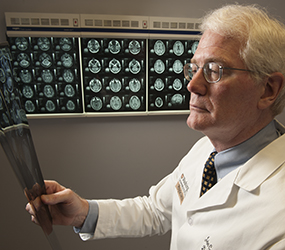Two major Alzheimer’s disease studies at Washington University School of Medicine in St. Louis have received federal funding totaling $30 million over the next five years.
The grants renew support for research at the Charles F. and Joanne Knight Alzheimer’s Disease Research Center to identify biological changes or biomarkers that can be used to detect the disease and track its progression. Researchers hope these biomarkers will allow them to start Alzheimer’s treatments years before patients develop memory loss and dementia.

The funding comes from the National Institutes on Aging of the National Institutes of Health (NIH).
“As populations around the world age and the incidence of Alzheimer’s disease increases, it’s becoming increasingly urgent that we better understand this condition and find ways to stop or slow it,” said John C. Morris, MD, the Harvey A. and Dorismae Hacker Friedman Distinguished Professor of Neurology and director of the Alzheimer’s Disease Research Center. “The new funding will help us keep pushing forward.”
Among the questions about Alzheimer’s disease that researchers plan to investigate:
- Does sleep disruption accelerate the development of Alzheimer’s symptoms and help predict when dementia will begin?
- Can genetic variations reduce the rate at which symptoms progress in Alzheimer’s disease?
- Do these protective variations explain why some people have extensive Alzheimer’s changes in their brains without developing memory loss or other cognitive problems?
One grant provides $18 million to the Dominantly Inherited Alzheimer’s Network (DIAN), an international effort to assemble a registry of families with inherited forms of Alzheimer’s disease.
“These forms of Alzheimer’s are so rare that many people were skeptical that we could meet our goal of enrolling 400 participants,” said Morris, the principal investigator for DIAN. “But we not only met our recruitment goal, we exceeded it.”
With the grant, DIAN scientists will continue to enroll families at centers across the United States, Europe and Australia. Funding also will help researchers monitor the disease’s progression in participants who inherited the disorder.
DIAN participants also have a chance to enroll in a separate trial, the DIAN Trials Unit, that is evaluating treatments for inherited Alzheimer’s disease. The trial gives Alzheimer’s drugs to patients years before the onset of symptoms, hopefully laying the groundwork to one day do the same for people with more common forms of the disease, which typically develop later in life.
The other grant provides $12 million for the Healthy Aging and Senile Dementia study, which began in 1984. Morris also is principal investigator for this study, which is dedicated to long-term monitoring of the cognitive health of older adults who volunteer to be studied.
Among other breakthroughs, scientists used data from this study to establish and validate the clinical dementia rating, the five-point scale now employed worldwide to assess the mental decline in patients with symptoms of Alzheimer’s.
The renewed funding is in addition to a recently announced $26 million grant to the Dominantly Inherited Alzheimer’s Network Trials Unit, directed by Randall Bateman, MD, the Charles F. and Joanne Knight Distinguished Professor of Neurology. The trials unit uses the family registry built by DIAN for a clinical trial of treatments to prevent Alzheimer’s dementia in people otherwise destined to develop the disorder.